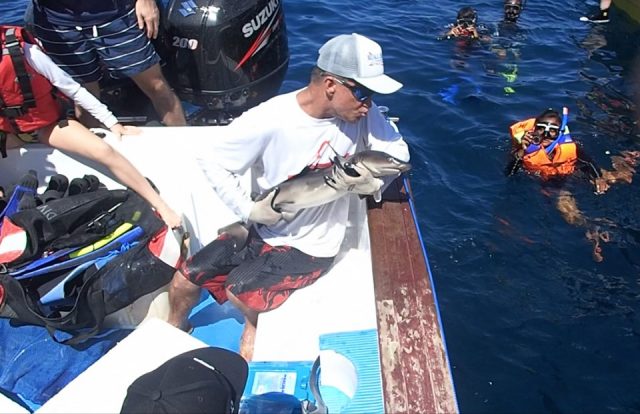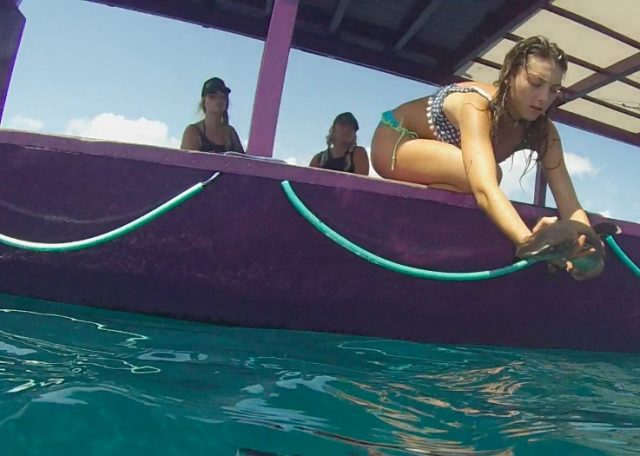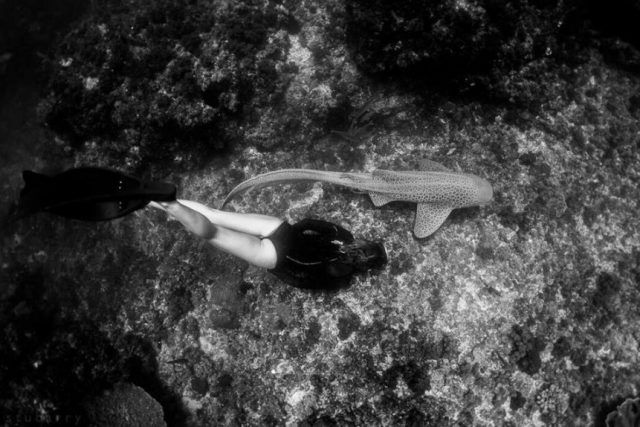 “I think people know about shark finning, but they don’t know the severity.”
“I think people know about shark finning, but they don’t know the severity.”
Byron Bay lady, Emily Horton, has been fundraising for the conservation of sharks in Indonesia. She also travels to Indonesia herself to help the organisation ‘Bali Sharks’ in the capture and release of sharks to marine conservation zones. I sat with Emily in Mullumbimby to discover what drives her passion for marine conservation, and to find out how others can support her worthy cause.
Emily Horton Though I live in Byron Shire I grew up in Brisbane. I’ve always been fascinated by animals and I love the ocean’s hidden underworld treasures. I was scuba diving during a Year 12 Biology camp, and my camp instructor said that if I loved wildlife, then I must continue with my scuba to further explore all facets of marine life. My desire to protect marine life grew from that.
I was the ‘different one’ in the city, I cared about life and picked up rubbish on the streets. From my past life in Brisbane, I am pretty sure that I am the only one striving to become a marine biologist. While I was in Year 12, I’d get up very early on a Friday morning to complete my school day, then I’d travel down to the Gold Coast to partake in whale research with Griffith University. The program was called ‘Humbacks & Highrises’, and with the guidance of my camp instructor, Olaf, I’d carry out Humpback Whale photography; taking fluke ID shots, while recording data on whale behaviour. I moved down to northern NSW as soon as I finished my final school exams. I am now doing a double degree in Marine Biology and Environmental Science at SCU.
Shark Finning in Indonesia Unfortunately, fisher folk are capturing and killing sharks around the coastlines and islands of Indonesia. Their income derives from the ocean, it surrounds them, and there is a big market for shark fins in China. These fishermen are not educated, so they don’t see their behaviour as depleting the ocean. If you talk to these people they are lovely, they are just trying to feed their families. But if you take sharks out of a very complex food chain a ‘Trophic Cascade’ occurs. There is a wide range of species who have intricate biological adaptations designed in their favour to avoid predation from sharks. This is a biological and ecological strength. When you take Apex predators out of an ecosystem there is a decrease in other species, due to an increase in the sub-predators. Sharks pick off the weak, the sick. As species are affected, especially where sub-predators take out smaller species at a rate higher than was naturally occurring when sharks were more abundant, we have problems such as coral reef algae blooms occurring. Healthy oceans means a healthy planet.
It is so hard, I find myself preaching to the converted, as many don’t care about, or understand, sharks. It’s in China where the hunger for shark fins occurs. It is hard to go and educate people, say in Beijing, if they are not surrounded by the ocean, then they don’t have that connection. If you stop the killing of sharks the impact hits China mainly. As soon as there is no market for shark fins in China then the money trail ends.
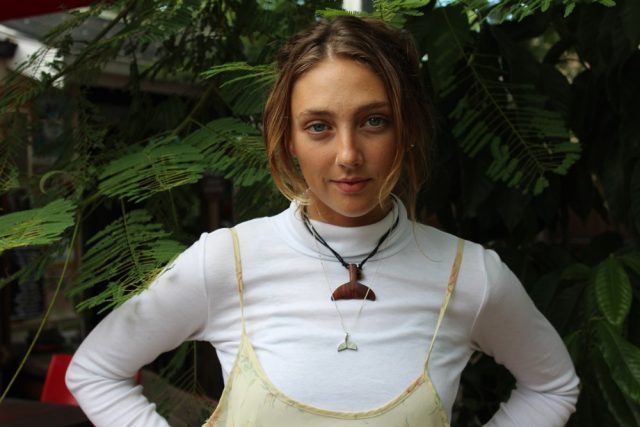
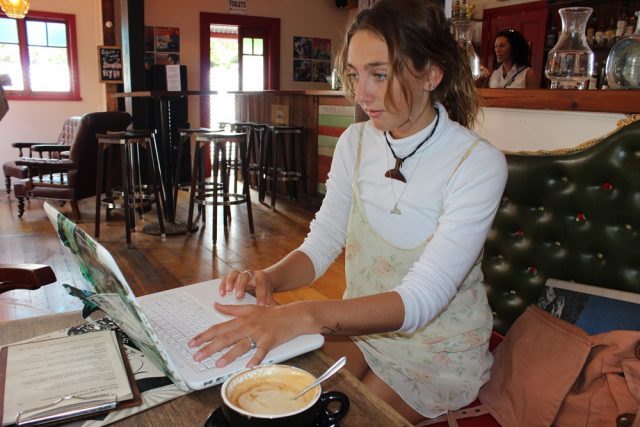
The collection and relocation of sharks in Indonesia
Thankfully there are people willing to give up their time and income to protect the ecological underdogs- like the sharks of Indonesia. Emily Horton has become an ecological warrior in the protection of Indonesia’s sharks.
She is not alone in all this.
Emily: Marine conservationist Sean Samer is a friend of mine. For my birthday, I wanted to partake in a shark conservation workshop in Indonesia alongside Sean, and that is where I first met Paul Friese. He is a Hawaiian who operates the world’s only rescue and release of sharks. Paul Friese’s organisation is called Bali Sharks: Shark Rescue Center. Paul built his floating rescue centre over a five-year period from recycled goods. Scientific research is also facilitated at the centre.
Paul Friese has definitely been successful in the relocation of sharks in Indonesia. When he first started out five years ago he had to buy sharks off the fishermen. Over time a relationship between Paul and the fishermen grew. Initially they thought he just wanted to kill the sharks, and upset their businesses. They wanted to cut his nets, they thought he was there to harm their livelihoods. They now give him the juveniles as they aren’t worth much. Blacktip Reef Sharks and Whitetip Reef Sharks are the main species targeted for their fins. He releases them in the Gili Islands and other marine protected areas. I too saved sharks from nets there, releasing them to a safe place, it felt great!
It took Paul sometime to work out what does, and doesn’t work, when it comes to capturing, keeping and then relocating sharks. His pontoon needed fixing after a storm and he wanted to rebuild it as a community centre. When he was up and running again, Paul had people swimming with the penned-sharks as part of an ecotourism incentive to raise cash, which then went into funding the sharks’ release to the Gilis. He doesn’t make money from the venture, it’s purely conservation. However, local fishermen copied him. They installed bigger-n-better ecotourism ventures where tourists swam with much larger sharks. But these were not relocated. At least Paul prevented the local sharks from being killed. It was a step forward. He employed local fishermen in his project. He told the locals that shark preservation would be better for them, as a healthy ocean meant healthy fish being caught.
When readying the sharks for the journey from his Shark Rescue Center to the marine reserves, Paul scoops the sharks up in nets then places them into polystyrene containers. He has air-pumps for their oxygen requirements. He had to better understand the sharks’ need for oxygen. The oxygen movement across their gills was a research focus, especially in regards to the Blacktip Reef Sharks, who are sensitive to standing still for long periods. He then seals the containers, stacks them, and watches them during the journey to their new homes. Paul also carries out the rescue of sharks from bars and aquariums. The music pounding into the sharks when held in tanks in loud bars must be like psychosis to them. The sound would be rushing at them intensely, they are highly sensitive to sound as part of their biological adaptation to sourcing movement.
Public awareness of shark-finning I think people know about shark finning, but they don’t know the severity. Many don’t feel sympathy, especially around here at the moment with the recent shark attacks. They don’t like them. They are the most misunderstood of all creatures. The sharks killed are reef sharks and they are fundamental to the health of entire ecosystems. Oceans create 80% of the world’s oxygen, many people don’t feel they are directly impacted as they are disconnected from marine ecosystems. In the future, they will have a different perspective.
Fundraising to protect Indonesia’s sharks There were 50 people at my fundraising night in Myocum. I had a 5-piece band play, which popular musician, Tormaigh, organised from goodwill. It was so amazing. It took me a month to organise the event which took place on the 25th Feb. I raised $800, it definitely went well. I was hoping to raise $600, everyone was so generous. The money raised will go to ‘Bali Sharks: Shark Rescue Center’ and it will purchase shark transfer boxes, their feed, and geogrid mesh – so they can’t escape from their ocean pens. From the Bali Sharks website: https://www.indiegogo.com/projects/shark-rescue-center-education–3#/ … you can also see the various donation prices for each conservation requirement. I had raffle tickets with prizes donated from people who gifted various items. This included a hanging wire shark sculpture donated Ania Caffarena, and a framed photo of a huge tiger shark donated by Matt Draper Fine Art Print.
I wanted to invite people who didn’t necessarily know a lot about the subject, and not just my shark saving friends. People were curious about where their money was going, yet very few questions were directed my way as to the shark’s welfare. I spoke about the importance of shark welfare before showing a film about the conservation project. I guess there was enough information for them all from this. My house is like a big hall so I wanted people to feel like they were in the ocean. I had two screens rolling footage of hammerhead shark schools and other shark ecology related scenery. I will head over to Indonesia during my university holidays to help Paul with his shark rescues and releases. There has been a successful reverse in the ‘Tropic Cascade’ in the Gilis, reef health is improving since more sharks have been released there. Alongside relevant scientific research on marine biology, and marine ecology, there is a big diving community there who also help monitor reef health, and other positive environmental changes occurring there in the Gili Islands.
How can people get involved?
Things people can do to reduce their impact on the environment can include not eating tinned-tuna. The super trawlers which catch tuna use indiscriminate trawling practices. They kill all species of fish, turtles, dolphins, sharks and whales, regardless of size limits. Involve yourself in local environmental organisations, like attending the ‘Positive Change for Marine Life’ clean-ups at 8:30 am, Saturday mornings, on Main Beach Byron Bay. Education on the importance of the ocean is required to protect sharks and other marine species. People need to understand how it all works. Preservation comes from understanding. Thus, continued support via the awareness of the plight of the sharks, and the negative impacts related to shark removal from the food web, is very important. You can support me and the sharks by going to the Paul Fries Bali Sharks website link.
Will you continue to raise awareness of shark finning & are there other causes you wish to support?
When people feel that sharks don’t have a purpose then they don’t act to protect them. I will! People can be mean, I have been sent photos showing cruelty towards sharks. People may choose to ignore the evidence given to them, but sharks play a hugely important role in our oceans. Last November I visited the Bundaberg region. Sadly, 75% of turtle hatchlings died there because the sand was too hot, and all females were spawned due to the elevated temperatures. The poor babies were actually cooking when walking through the sand to get to the safety of the ocean! This made the decision to partake in a SCU turtle hatchery and permaculture project in Sumatra, during the uni-holidays later this year, an easy one. We will be educating the locals there on how to live more sustainably alongside nature. We will be building gardens, growing veggies, while protecting and nurturing ocean turtle populations. I am also involved in ‘Boomerang Bags’ which is an initiative designed to remove the need for plastic in our lives, by selling reusable bags made from recycled goods. From Byron’s Yak Youth Centre we are busy on our sewing machines making the bags. We give out these bags to local shop owners. The shopper can use the bag if they forget their own bag, and then bring it back to the shop, thus no need for a plastic bag.
Support Emily & Paul Bali Sharks website:
https://www.indiegogo.com/projects/shark-rescue-center-education–3#/
